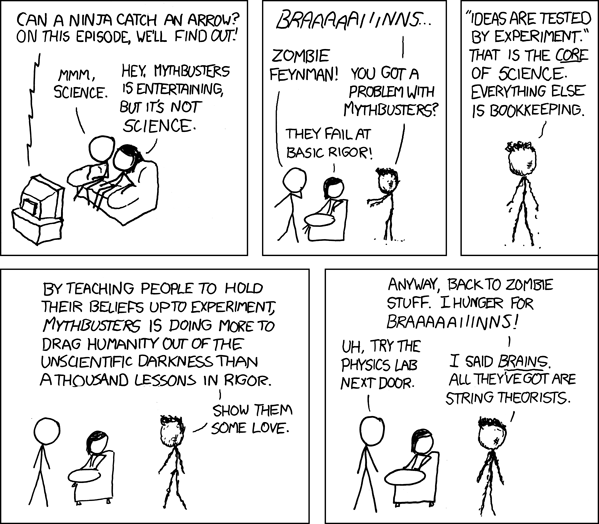
(Image credit: XKCD)
It occurrs to me that we have two goals for science education. One is to teach students what existing science is known, and how it can be applied to our lives, or how it is interesting to us. I call this first purpose, "Science History." The other goal is to teach the process of doing science, of thinking scientifically. This purpose, I call "Science Inquiry."
I think we should separate these two purposes into separate courses or domains, because the purpose of the first is diluting the effect of the second. Many children finish school thinking that science is a collection of facts known about the world, and do not spend enough time learning how those "facts" were derived.
Labs are a good start to learning science inquiry, but many experiments done in labs have issues.
- The labs are rarely designed by students. This leads to underestimate the difficulty in designing a good experiment, and to over-emphasize the paperwork portion of science.
- The labs rarely take more than 30 or 40 minutes to complete. Students rarely have to repeat a lab because of experimental error. They learn from this experience that laboratory science can be easily parcelled into sitcom-like episodes.
- Students do not learn enough about the reasons why we have designed lab reports, and think of the portions of a lab report as blanks to be filled in. Quite often they will fake data so as to complete the boxes faster.
A Science Inquiry course would focus on the process of doing science, and less on the students learning existing scientific knowledge. Obviously students would be likely to find connections between the Science History course and the labs that they design, and hopefully they will also see connections between their Science Inquiry and other domains of knowledge.
A Science History course would focus on what existing scientific discoveries we have made, who made these discoveries, and what are the stories around these discoveries, and how these discoveries impact our lives. It might cover some principles behind the philosophy of science, as well as the connections between science and other domains of knowledge (like math for example).
Right now, many schools see Science Inquiry as optional or even an inconvenience. This suggests to me that some people think that thinking scientifically is an inconvenience or too troublesome to teach, and this scares me. While "thinking scientifically" isn’t the only way to think, it’s an important one, and certainly, we should all learn how to do it. I also think that Science Inquiry is indistinguishable from thinking scientifically. If you remove the inquiry, then it isn’t really science.
Bryan Sanctuary says:
Although I see the wisdom in separating the two, history and inquiry, I feel that it should not be done. I am not so familiar with high school students,but I see them at university. I actually find that the introduction of history is a great motivator for teaching. It introduces a human element; the history is indeed rich; and it allows the teacher to break up the tedium of teaching scientific method.
I see students straight out of high school, and there is a much more important problem. The vast majority of these freshmen have learned science by rote. They are shocked when they have to think or use logic. I always hear “Do I need to memorize that for the exam?” I usually answer: “You do not have to memorize that, you have to know it.”
To me the teaching of science should stress the development of ideas based upon experimental evidence. But I do not think that comes across to students in high school programs.
April 24, 2012 — 6:58 pm
David Wees says:
That’s my experience as well, and my hope is that by separating the two aspects of science education, you may be able to separate the old science pedagogy from the new inquiry methods more effectively. In other words, the inquiry based course CANNOT be taught effectively using rote methods, and so new methodologies will have to be employed, and students will benefit.
April 24, 2012 — 7:16 pm